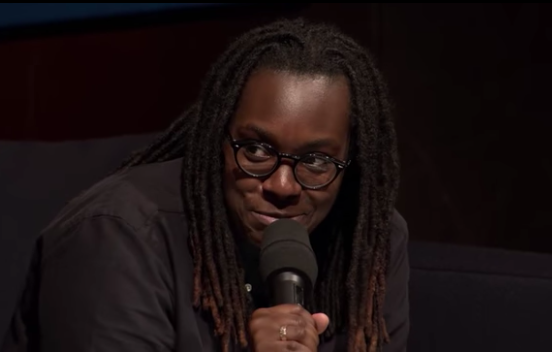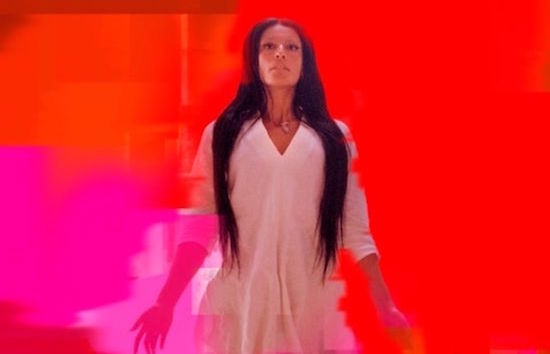Sevdaliza
Berlin’s architecture is fascinating and formidable
It’s sunny and crisp in the city and the history of every space we visit during the festival feels immense – it’s evident at the venue where the Academy itself is taking place, Funkhaus, but more on that enchanting place later.
At the Volksbühne (‘people’s theatre’) especially, it feels like we’re stepping back to the early 20th century, all wood-panelled walls and grandiose entrance hall. When Sevdaliza arrives on the stage to perform the premiere of her new show, The Great Hope Design, it’s hard not to feel small and underdressed – as though this is some big, old-style production that requires cocktail attire. Her stage presence lives up to that fascinating theatricality – there are beautiful costume changes (the final one makes her look like glamorous widow); a dancer in nude tones contorting around the Dutch-Iranian artist in a way that toys with the borders of sensuality; and, unfortunately, a somewhat ill-conceived on-stage camera that invasively shoots close-ups that appear in real-time on the screen behind her, which is visually interesting in small doses but ultimately overused as a device.
At its best, the show offers a sense of beguiling dystopia (she emerges, at the start of the performance, angular yet graceful from a pile of wires coiled in the centre of the stage, and it feels the perfect antithesis to the current Björk Utopia show where those swanlike flautists emerge from flowers). The negative is that the show is too long, to the point where her powerful voice starts to lose its sense of captivation – though, given the number of people fully yelling “WE LOVE YOU SEVDA” and cheering for an encore from their plush seats, this might have been a sentiment most of the crowd did not agree with.
Black British music translates oddly, but still thrillingly, to a largely foreign audience
Black British music is unquestionably one of the most exciting forces in the UK soundscape – but there’s something quite surreal about its iteration at the Bass Union night at Anomalie. A warehouse-esque gallery venue with artsy light installations and angular walls, the general aesthetic is kind of Hackney Wick on steroids (though, perhaps more accurately, Hackney Wick is a pared-down version of cool Berlin spaces). It gives a serene feeling that’s perhaps jarring for a night that invites an exploration of bass music from innovators across Europe. The glorious sounds of someone like French artist Teki Latex largely work in crepuscular Berlin territory (albeit via an unexpected and wonderful play of ‘Forever Young’), but while the UK artists do essentially work too, it’s in a way that feels quite different from anything else tonight and it’s received quite differently than it would be at home.
Sevdaliza
It’s an excellent line-up, with Tash LC, Gaika, Nadia Rose, D Double E, and Goldie. Any of them would have a venue this size heaving and humid in pretty much any major UK city, but here it’s a relatively calm affair – many of the attendees are participants in this year’s academy from around the world, and their presence is perhaps appreciative rather than fanatical. Still, Double’s crowd does still have what appear to be middle-class white dudes doing gun fingers, so maybe some things are truly universal. Double’s set is great, but a little more subdued than you might expect in spite of an enthused audience – Gaika goes the opposite way, where a relatively subdued crowd finds him climbing on top of the decks, imploring people to dance. A highlight of the night is perhaps Tash LC dropping a choppy, bass-heavy remix of Mr. Vegas’ ‘Heads High’, but the whole thing is a reminder of how proud we can be of Britain’s exceptional black artists right now as even the most left-field among them can claim an international stage.

JLin
In spite of having no real musical talent, I would like to go to the Red Bull Music Academy
Aside from a youth spent playing the flute (very much before it became a cool trap and pop instrument) and occasional bouts of making very bad autotune music on my laptop, I am very much at peace with not being musically talented. But (and I realise how much this reads like #sponsoredcontent) sitting in on a day at the Red Bull Music Academy deeply made me want to be musically talented so I could be a part of it.
RBMA was started in Berlin in 1998, before it became an institution that would pop up in a different city with each year – but for the 20th anniversary, this was it’s homecoming. They took over Funkhaus, an astounding building that was once the home of the GDR Radio, and as part of the takeover refurbished the place, as well as bringing in all variety of recording tech. With the wood panels everywhere, the giant recording studio with mics hanging from the ceiling that looks like a ballroom, the curved corridor where light falls in, even the way it’s right by a lake – it’s just really striking as a space.
On the first night, the participants – who are all burgeoning artists from around the world – are put into teams with a different tutor (Just Blaze being one of them!), and made to pick a random series of words – they must then make a piece of music that fits these words (“sizzling flirtatious rocks” and “velvety inspired sponge” being among the highlights) and play them to everyone else. It makes for a really sweet exercise.
As you have doubtless seen on the internet, guest lecturers come in and tell the students stories about their time in the industry – we catch Gudrun Gut and it’s fascinating to hear the specifics of experimental musical development from someone who has lived in Berlin since the 70s. Given that other lectures came from Jlin and Pusha T, I am very sad to not be someone participating in the Academy.
It’s stupid to pretend brands aren’t providing an important space for artists in an industry where it’s harder than ever to get paid
This is such a tricky area, I realise – because does the true, weird underground really benefit from the money of corporations like Red Bull and their support of artists? Probably not, but I’d still say there are enough artists out there who are not well-connected and who would not be able to afford to create without the support of something like RBMA, that you can justify its existence. Possibly I have been indoctrinated by the sway free, way-too-sweet energy drinks that I did not drink, but I think it’s more than that. I get talking to UK producer Impey, who is at the Academy when I am and who says that the ability to collaborate with all the other artists here is in itself a huge gift. As for the concept of a stigma, he says, “A lot of people are really quick to judge, but actually people are getting a massive opportunity they would never have had before – it gives people from around the world a way to get on this journey, people who are having to go to the furthest extents to do what they want in their home countries. It’s unbelievable and mad touching seeing people come into themselves. People do assume there’s something attached to big corporations doing stuff to be down with the kids, but I do have infinite love for them providing this kind of opportunity. They care about people who need this support.”
And to be honest, in a world where very few of us still buy music, he’s right about the incomparable support network. I want to be cynical about the Red Bull and vodka I’m plied with when I arrive, but in truth all that stuff is besides the point – in terms of what they’re giving to these artists, I’m pretty convinced.


